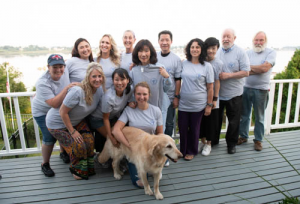
It was a year ago (August 2019) when we convened our third annual Gathering of my students and faculty at The Professional School of Psychology (PSP). Eighteen doctoral students and five faculty members came to my home and town in Maine for one intensive week of study, dialogue, celebration and a “taste of Maine.” In previous years, we gathered together on the shores of the Northern California coast and on the beaches of Bali. Our focus, in part, during the Maine Gathering was neurobiology and the implications of emerging findings in this field for professional psychology practices.
Along with the serious academic exercises were the moments of collegiality enhanced by some lobster, theater, and shopping at L. L. Beans. During several evenings, I hosted our guests from around the world (mostly Asia and North America) at my home on the Maine coast. Greeting our visitors with great enthusiasm was the loving golden retriever that inhabit the home and heart of my wife and I. Our dog’s name is “Gracie.” Everyone fell in love with Gracie and she is photographed with the rest of us for the official Gathering picture. Gracie is a full-fledged member of the PSP community.
 I provide all of this as background because a remarkable event occurred during one of our sessions on neurobiology. One of our doctoral students was making a presentation regarding the integrative processes occurring in biological systems: one can’t simply separate the different parts of a biological system and expect that when you put them back together there will be a living system. This student used Gracie as an example: “if you were to carve up Gracie and reassembled her there would only be a dead, dissected dog.” There was an immediate and quite emotional shock in the room: “you can’t carve up Gracie!” While this was initially brushed off as just a theatrical gesture that reinforces the important of integration, the “carving up Gracie” became a recurrent theme at the Gathering.
I provide all of this as background because a remarkable event occurred during one of our sessions on neurobiology. One of our doctoral students was making a presentation regarding the integrative processes occurring in biological systems: one can’t simply separate the different parts of a biological system and expect that when you put them back together there will be a living system. This student used Gracie as an example: “if you were to carve up Gracie and reassembled her there would only be a dead, dissected dog.” There was an immediate and quite emotional shock in the room: “you can’t carve up Gracie!” While this was initially brushed off as just a theatrical gesture that reinforces the important of integration, the “carving up Gracie” became a recurrent theme at the Gathering.









